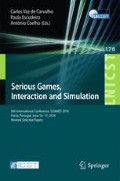Abstract
There is a need to harness the potential of a hybrid space in teaching and learning as digital and physical experiences are merging and it is essential that the experience empowers the minds and practices, bridges formal and informal contexts and deepens the learning process. This paper elaborates on the playful nature of the use of games and gamification in creating contexts to a pervasive learning process including the Horizon 2020 Beaconing project as an example.
Access this chapter
Tax calculation will be finalised at checkout
Purchases are for personal use only
References
Warburton, S.: Second life in higher education: assessing the potential for and the barriers to deploying virtual words in learning and teaching. Br. J. Educ. Technol. 40(3), 414–426 (2009)
Arnab, S., Petridis, P., Dunwell, I., de Freitas, S.: Enhancing learning in distributed virtual worlds through touch: a browser-based architecture for haptic interaction. In: Ma, M., Oikonomou, A., Jain, L.C. (eds.) Serious Games and Edutainment Applications, pp. 149–167. Springer, London (2011). ISBN: 978-1-4471-2160-2
E-Learning Guild, Seamless Learning: Forget MOOCs, Mobile Learning, and Ubiquitous Access. Learning Solutions Magazine (2014)
Pramling Samuelsson, I., Johansson, E.: Play and learning—inseparable dimensions in preschool practice. Early Child Dev. Care 176(1), 47–65 (2006)
Broadhead, P., Howard, J., Wood, E. (eds.): Play and Learning in the Early Years: From Research to Practice. Sage, Thousand Oaks (2010)
Upton, B.: The Aesthetic of Play. MIT Press, Cambridge (2015)
McGonigal, J.: Reality Is Broken: Why Games Make us Better and How They Can Change the World. Jonathan Cape, London (2011)
Rooney, P.: A theoretical framework for serious game design: exploring pedagogy, play and fidelity and their implications for the design process. Int. J. Game Based Learn. 2(4), 41–60 (2012)
Arnab, S., Brown, K., Clarke, S., Dunwell, I., Lim, T., Suttie, N., Louchart, S., Hendrix, M., de Freitas, S.: The development approach of a pedagogically-driven serious game to support relationship and sex education (RSE) within a classroom setting. Comput. Educ. 69, 15–30 (2013). Elsevier
Deterding, S., Khaled, R., Nacke, L., Dixon, D.: Gamification: toward a definition. Presented at the Computer Human Interaction, CHI 2011, Vancouver, British Columbia, Canada. ACM (2011)
Hamari, J., Koivisto, J., Sarsa, H.: Does gamification work? – A literature review of empirical studies on gamification. In: Proceedings of the 47th Hawaii International Conference on System Sciences, Hawaii, USA (2014)
Jantke, K.P., Spundflasch, S.: Understanding pervasive games for purposes of learning. In: 5th International Conference on Computer Supported Education, CSEDU 2013, pp. 696–701 (2013)
Schmidt, A.: Context-aware computing: context-awareness, context-aware user interfaces, and implicit interaction. In: Soegaard, M., Dam, R.F. (eds.) The Encyclopedia of Human-Computer Interaction, 2nd edn. The Interaction Design Foundation, Aarhus (2014)
Savin-Baden, M.: Facilitating Problem-Based Learning. OUP, Buckingham (2003)
Acknowledgement
This work has been co-funded by the EU under the H2020 Beaconing project, Grant Agreement nr. 687676.
Author information
Authors and Affiliations
Corresponding author
Editor information
Editors and Affiliations
Rights and permissions
Copyright information
© 2017 ICST Institute for Computer Sciences, Social Informatics and Telecommunications Engineering
About this paper
Cite this paper
Arnab, S. (2017). Playful and Gameful Learning in a Hybrid Space. In: Vaz de Carvalho, C., Escudeiro, P., Coelho, A. (eds) Serious Games, Interaction and Simulation. SGAMES 2016. Lecture Notes of the Institute for Computer Sciences, Social Informatics and Telecommunications Engineering, vol 176. Springer, Cham. https://doi.org/10.1007/978-3-319-51055-2_2
Download citation
DOI: https://doi.org/10.1007/978-3-319-51055-2_2
Published:
Publisher Name: Springer, Cham
Print ISBN: 978-3-319-51054-5
Online ISBN: 978-3-319-51055-2
eBook Packages: Computer ScienceComputer Science (R0)

